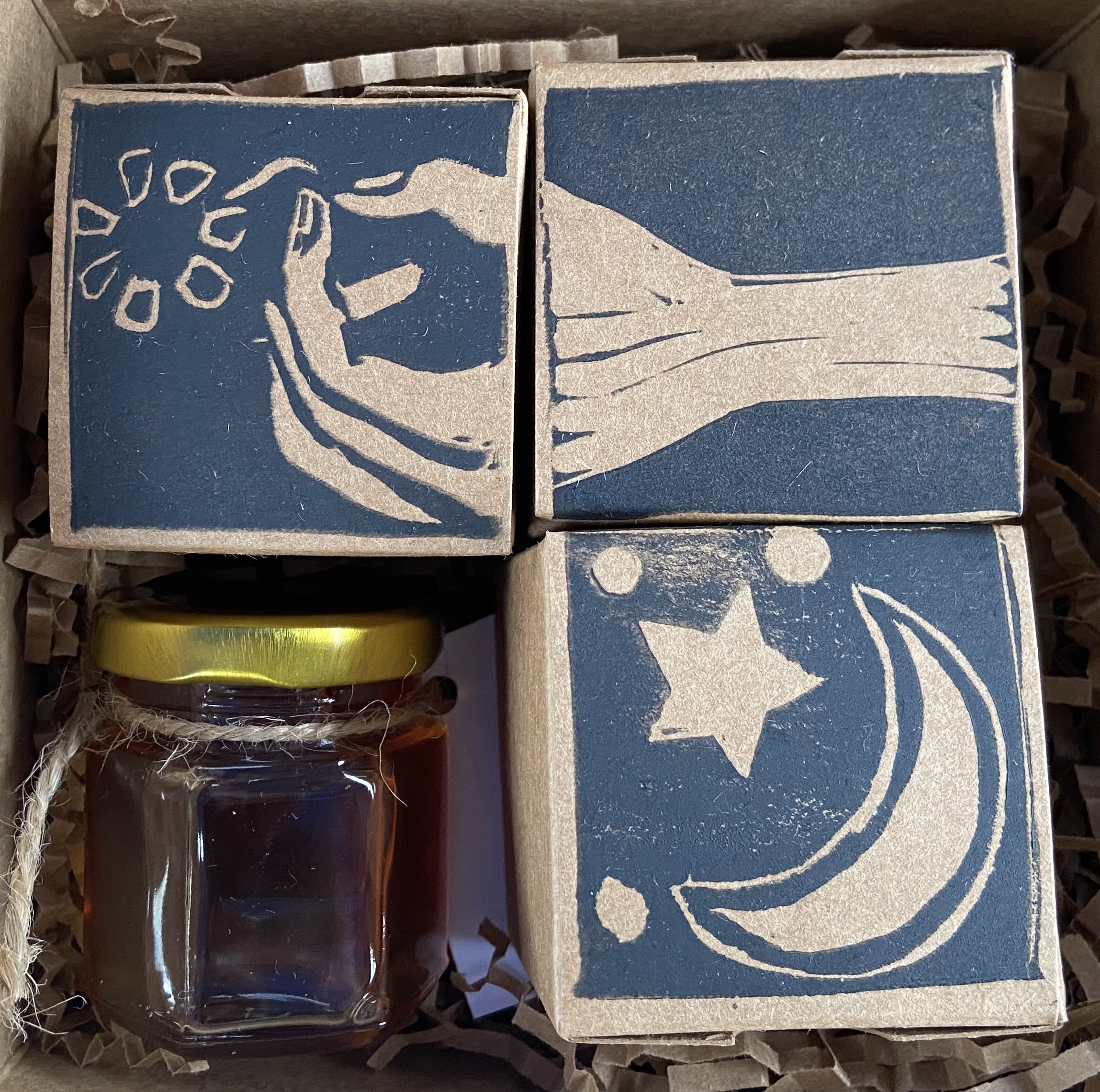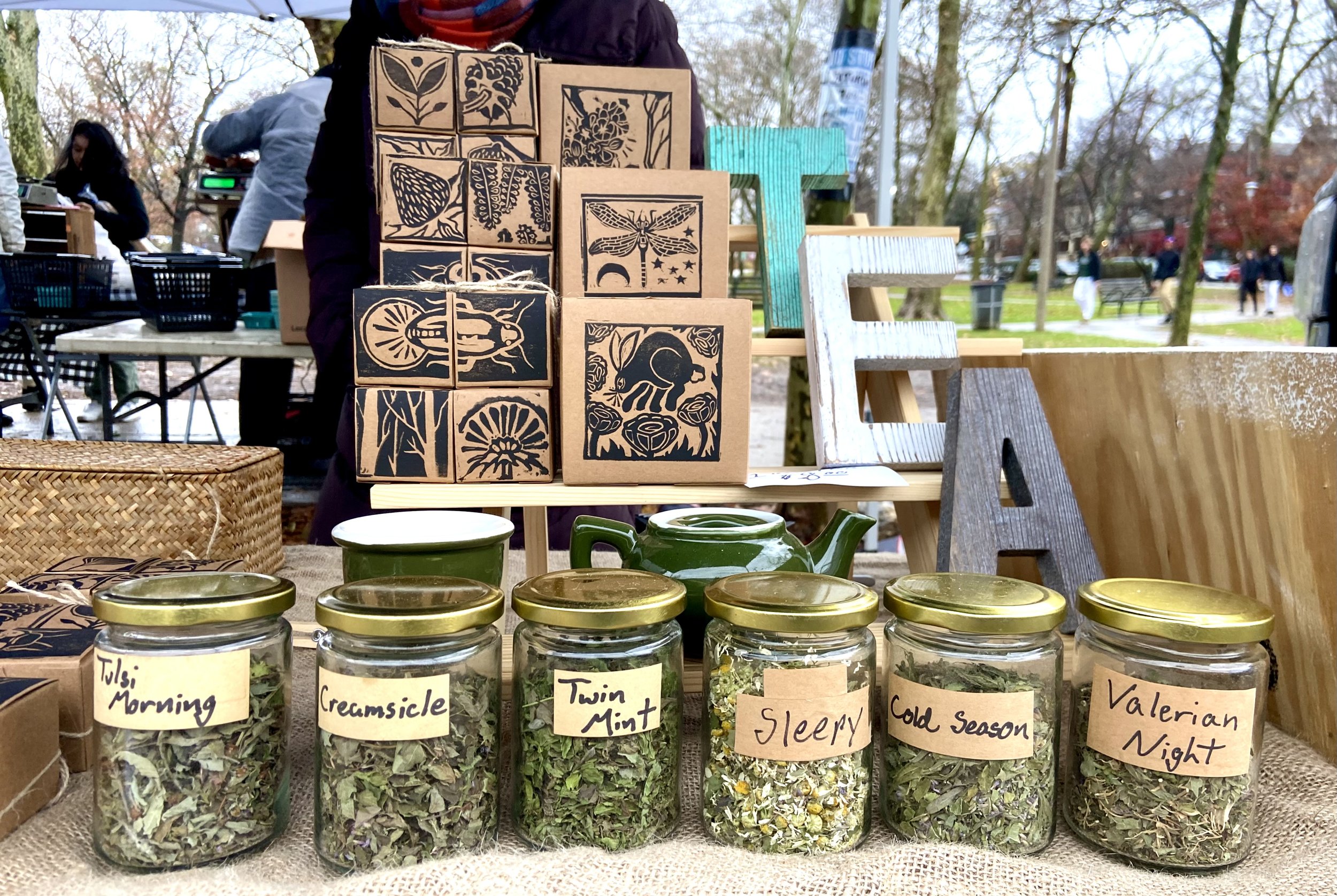A Visit to Clark Park Farmer’s Market
“When I think about a home-cooked meal, I think about something rich, warm, inviting, and of course delicious. This is what Poorva and Rajus think of too. Their stand is named after Rajus’ grandmother, Aaji, which means “grandmother” in the language of Maharashtra, a state in western India where most of Rajus and Poorva’s families are from.”
by Shriya Amin
Living in a big city can be a dream come true or a nightmare come to life for someone from a small town. As a native of a small town, I find it to be somewhere in between: Philly is dynamic and exciting, but also a bit vast and recrementitious. But even in the glitz, glamor, and dazzle of Pennsylvania’s metropolis, there are indeed spots where the home-town feels are abundant.
The Clark Park Farmers’ Market on Baltimore Ave and 43rd St happens every Saturday from 10:00am to 2:00pm year round. And it doesn't matter the weather―rain or shine, snow or hail, the vendors always arrive to provide a touch of small-town, farm-fresh magic to the big city. I had the chance to chat with a few of the stand owners to learn more about the motley crew that comprises this particular outdoor market.
Hands on the Earth Orchard
A family business that has been around since the start of the Market almost twenty-five years ago is Hands on the Earth Orchard. Dave Fahnestock inherited the land from his parents, and works with his brother, wife, and children to continue the dream they started. While the Hands on the Earth Orchard, formally known as the Fahnestock Farm, peddles fresh produce year round, they throw in seasonal products to keep things interesting and delicious. The summer months see colorful flowers added to the rows of ripe, sun-baked berries and tomatoes. In The fall, homemade baked goodies line the white folding tables under the well-known tents. Winter brings pressed-two-days-ago apple cider handmade-in-front-of-you apple cider donuts. Springtime is a bit of a reboot for the land as the farmers get ready to harvest the onslaught of fresh produce in the coming months.
And that’s mostly hand-harvested produce, mind you. Dave decided to change the company's name to reflect their distinctive practice: Hands on the Earth primarily operates without the use of heavy machinery to stay closer to the land. What Began as a way for the Lancaster-based Fahnestocks to earn a better living at the turn of the century has become a way to interact with others and bring the farm and its fresh products to a community with limited access to such goods. Meeting customers and other vendors at the Clark Park Farmers’ Market “is what makes the job fun; otherwise it’s just a job”. Life on the farm is indeed rewarding, but Dave acknowledged that it can also be taxing at times, which is why hearing his children receive praise from others for their work at the Market is especially gratifying. There is a reason that the family-owned Hands On the Earth Orchard has maintained their stand at the Clark Park Farmers’ Market for over two decades. Stop by one Saturday and see it for yourself.
Primordia Mushroom Farm
Think back to the last time you ate mushrooms. Chances are, they were probably of the portobello, crimini, or white button variety. Makes sense: they are plentiful at the grocery store, and you can mix them into pasta dishes and soups, stuff them for barbecues, or toss them raw in salads without too much fuss. Turns out, there are dozens of other types of delicious, hearty mushrooms waiting to be tried under the Primordia Mushroom Farm tent at the Clark Park Farmers’ Market. The husband and wife duo, Matthew and Jesse, started the farm in 2012. The Clark Park Farmers’ Market was the perfect place to introduce their product to Philadelphia because its season matched that of their mushrooms: it was year-round. Mushrooms need to grow in spring- or fall-like environments. They love temperate and humid habitats, which means the barns they live in need to be climate-controlled. Since “there are lots of varieties that can't be cultivated”, the couple can also find their products like “chanterelles and chicken-in-the-woods” in the wild.
In the last decade, the certified foragers have grown their small family business to include about a dozen species of mushrooms housed in two barns. At the Market, they spent that time educating others on the values of mushrooms. And let me tell you: there are definitely values. As a certified herbalist, Jesse enlightened me on the healthfulness and immune system-balancing properties of fungi―the benefits of which are only reaped when cooked. She recommends sautéing mushrooms in a pan with some butter for about ten minutes. The exact time depends on the variety, but finding your own preferred consistency is the key. So if you’ve never seen the pretty color of yellow oyster mushrooms, or the fluffy-looking tops of a lion’s mane, pop by the Primordia Mushroom Farm stand to take a peek―and maybe a bag! The vendors love chatting with mushroom-newbies, and experiencing the diverse culture of this West Philly Market.
Squirrel Dance Farm
If fresh fruits and vegetables aren't your thing, don't sweat it; the Clark Park Farmers’ Market has plenty more to offer. The crew at Squirrel Dance Farm wants to connect with their customers by way of art, tea, honey, and flowers. The owners, Alex and Katherine, inherited the land from their uncle a few years ago and started the business to share their unique crafts and products with the Philly crowd. They kept the clever and one-of-a-kind name―and who can blame them? Their uncle was a bit of a jokester and one day decided to put a coconut out in the yard for the squirrels because it was “a nut they [couldn't] crack”. The squirrels were indeed intrigued, and proceeded to perform a sort of dance around the curious object to express their confusion. What isn't confusing is the Farm’s contribution to the Market. As a “trans woman in agriculture, [Alex feels] motivated to be visible because there aren't very many people in that position”. The “friendly and inclusive” Market has provided Squirrel Dance Farm a space where customers express themselves through style and clothing, and come to support local artisans―two aspects Alex and Katherine love. They set up their stand June through December every year, so be sure to visit them then.
Aaji’s
When I think about a home-cooked meal, I think about something rich, warm, inviting, and of course delicious. This is what Poorva and Rajus think of too. Their stand, Aaji’s, is named after Rajus’ grandmother, Aaji, which means “grandmother” in Marathi. Marathi is the language of Maharashtra, a state in western India, where most of Rajus and Poorva’s families are from.
They sell lonsa, a Marathi tomato-based condiment that is traditionally eaten with Indian flatbreads like paratha and chapati, sauteed vegetables, and rice. However, they encourage their customers―who they prefer to call “friends”―to try it on sandwiches, eggs, fish, and pasta, among other dishes. The four varieties they make include Classic, Garlic, Spicy, and Spicy Garlic. Similar in style to a cooked salsa, Poorva and Rajus mix Thai chiles, curry leaves, turmeric, mustard seeds, fenugreek, honey, jaggery, salt, and sometimes garlic, into over a pound of fresh tomatoes for each container of lonsa. Since it is indeed Rajus’ Aaji’s (secret) recipe, I wasn't privy to the amounts of each ingredient. But I was told the aromatic concoction is cooked for “several hours with love.” Each batch is overseen by the couple, and has a shelf life of at least six weeks. I used up my container in one night...I added a spoonful to my homemade pasta sauce, decided it needed a dollop more, then realized the plastic was empty because I’d dumped it all in. It was totally worth it! The slow heat builds up, as if it’s having a conversation with you while you're eating, and the flavors do wonders for any dish―the perfect recipe to leave you wanting more.
Aaji’s is a family business that started just after the pandemic, and joined the Clark Park Farmers’ Market in 2021. Poorva, Rajus, and their families want to bring a new element of food to a community that has seldom, if ever, tasted it before, and show their children that they can do anything―including starting a business from the ground up with a product that is unheard of but absolutely delicious. Learn more about lonsa at Aaji’s stand the next Saturday you find yourself in Clark Park.
The Clark Park Farmers’ Market is a space for customers and vendors to meet, chat, connect and share food with one another. Big cities have a way of making people feel like they are just one in a crowd, but the atmosphere at Clark Park is much more individualizing. Boasting a host of edible products and art, the vendors here are welcoming and friendly. At the end of each Saturday, they often trade their leftover products with one another so little to nothing goes to waste. Food goes hand-in-hand with community for me, and I love how this diverse weekly market embodies the comfortable feeling of a small town. I am immensely grateful that I discovered the Market after moving to Philly, and hope others do too. You never know what you’ll find under these tents.
Words and images by Shriya Amin
Learn more about Clark Park Farmer’s Market at their website https://thefoodtrust.org/what-we-do/farmers-markets/clark-park/
Aaji’s has partnered with The Uplift Center for Grieving Children, a non-profit Philadelphia-based organization that strives to provide children and families experiencing the grief of losing a loved one a place to heal. In August 2022, they donated one dollar for every sale they made. In sharing their food, Aaji’s aims to spread awareness on this issue and encourage others to join the cause.











